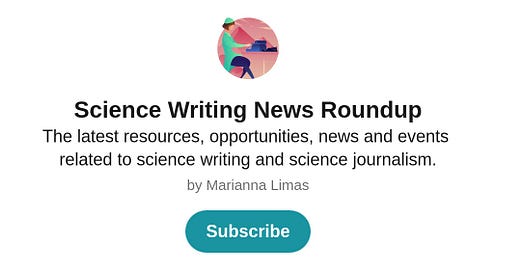✍️Science Writing News Roundup #25 (January 6, 2021)
Apply now for the Entrepreneurial Journalism Creators Program + A Q&A with Helen Branswell + How to price freelance writing projects
🖼️ Opportunities
Apply now for the Entrepreneurial Journalism Creators Program! Newmark J-School’s new online program helps independent journalists develop newsletters, podcasts, local sites, and other niche news products serving their audiences. Apply by January 24, 2021. It’s a short application, and scholarships are available!
Get a chance to further your health journalism knowledge through AHCJ fellowships: The AHCJ-CDC Health Journalism Fellowships and the AHCJ Reporting Fellowships on Health Care Performance offer journalists a chance to receive top training and a chance to find new sources and story ideas for their reporting.
ABSW Awards 2021: Submissions now open! The Association of British Science Writers recognizes excellence in science, technology, engineering and mathematics journalism and writing. Categories include: Editor of the Year (£1,000), British Science Journalist of the Year (£1,000), and more.



🔭 Ideas
How it started: A Q&A with Helen Branswell, one year after Covid-19 became a full-time job. Helen Branswell, STAT’s infectious diseases and global health reporter, has written 148 stories on the pandemic. “It’s my fervent hope that political reporters and business reporters and sports reporters and entertainment reporters are writing about politics and business and sports and entertainment and not about Covid-19 in 2025. But I think health and science reporters will still be writing about this disease four years down the road,” she says.
What journalists need to know when covering climate change. According to NPR’s Climate and Energy Editor, Jennifer Ludden, whenever extreme weather occurs, people often ask, “Did climate change cause that?” Scientists will say that’s the wrong question. The way to think about it is, “Did climate change make it worse?”
Best practices for reporting science for the public. Science Says developed a worksheet to help pull out important information from science papers quickly. In her “Science Reporting for the Public” workshop, Lindsey Mooney describes some of the obstacles and best practices for reporting science.
“Science writing was worth it. It just took longer than I thought.” Sheeva Azma explains how she became a science writer: “The pandemic was actually a great time for me to expand my business operations as, suddenly, everyone needed someone to explain the science of COVID-19 and best practices to them.”


🌄 Events
Conversations on COVID-19: Vaccines in the News (Caltech Science Exchange, January 11, 2021)
Online SciComm Coworking Session (January 13, 2021)
Distributing the COVID-19 Vaccine: A Virtual Conversation with Gerald Posner (Science Writers in New York, January 14, 2021)
Preprints in the Public Eye: Challenges and Solutions in an Age of Misinformation (January 14, 2021)
A Year of Errors and Lies – Looking Back on a Year of COVID-19 Misinformation (January 19, 2021)
How to Price Freelance Writing Projects (January 26, 2021)
🗺️ Career opportunities
Science Writing Internships, Smithsonian Environmental Research Center, Remote
Senior Editor, The Atlantic, Washington, DC/ New York, NY
Freelance Health Care Reporter, Axios, Remote
Writer/Editor, Berkeley Lab, Bay Area, CA, United States
Science writing intern, Chemical & Engineering News, Remote, US-based
More jobs 👉Science Writing News Roundup #24


👉 Don’t miss any updates from the Science Writing News Roundup:
Worried you missed something? See previous newsletters here. What would you like to see in the newsletter? Please send me your suggestions by replying to this email: sciencewriting@substack.com😃
If you liked this post, share it with your friends 💙


Note: Top image by freepik


